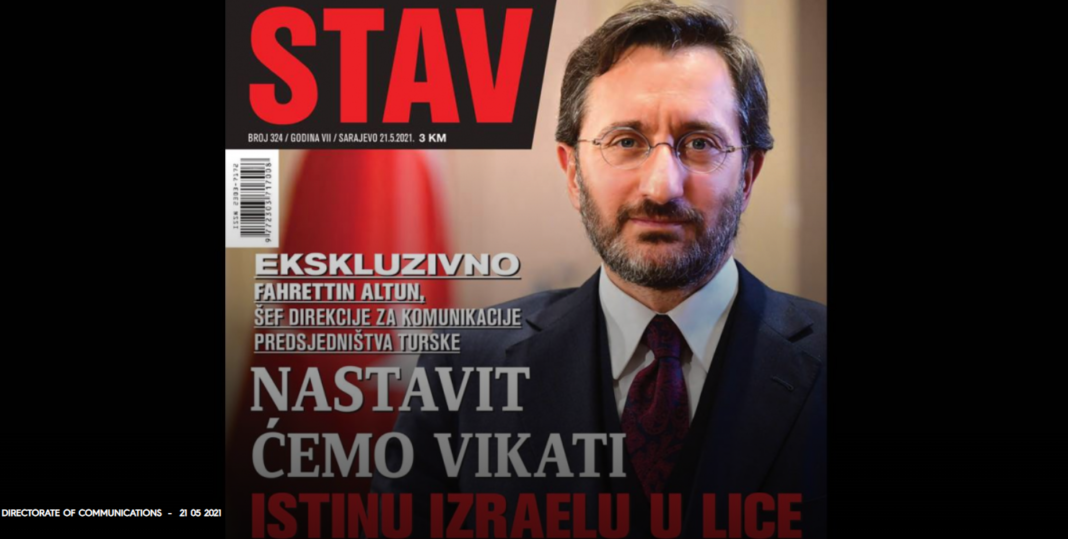Cengiz Holding, one of five conglomerates that have been awarded nearly all the large tenders in Turkey during President Recep Tayyip Erdoğan’s time in office, owns media outlets in Bosnia and Herzegovina, according to a special report by Deutsche Welle’s Turkish Service (DW Türkçe).
According to DW, Mehmet Cengiz, the chairman of Cengiz Holding, which is known to be close to Turkey’s ruling Justice and Development Party (AKP), is hiding his wealth and avoids taxes by means of offshore companies
Cengiz, whose wealth has grown considerably over the past two decades through questionable state contracts and funding in Turkey, has expanded his influence over the Bosnian media landscape.
Cengiz Holding, which is facing accusations of causing environmental damage in various regions of Turkey, winning lucrative government contracts and having tax debts forgiven, is now also making waves in Bosnia and Herzegovina. According to World Bank data, it is one of three companies that receive the most public contracts worldwide.
According to the Forbes list of the richest people in Turkey in 2020, the owner of Cengiz Holding has a total fortune of at least $2.2 billion. Investigative projects such as the Pandora Papers and the Panama Papers, conducted in collaboration with the International Consortium of Investigative Journalists (ICIJ), have revealed that Cengiz is channeling some of his wealth into tax havens.
One of the companies managed by Cengiz Holding, Eti Bakır A.Ş., which was privatized in 2004, received hundreds of millions of Turkish lira in grants in 2021 alone. Documents obtained by DW Türkçe show that Eti Bakır A.Ş. founded a company called Simurg Media in Bosnia and Herzegovina with capital of 58,000 Bosnian convertible marks (about 29,000 euros).
Simurg Media was founded in 2015 and operates two media outlets in Bosnia and Herzegovina: the daily online news site Faktor and the weekly political magazine STAV.
Speaking to DW Türkçe, Borka Rudic, the secretary general of the Association of Journalists of Bosnia and Herzegovina, emphasized that Simurg Media’s publications are aimed at the Bosniak Muslim people, who make up half of the country’s population. Rudic said the Bosnian market is small and that Simurg Media focuses mainly on a certain part of the Federation of Bosnia and Herzegovina. She explained that they have no chance of making a profit and hinted that Cengiz Holding’s investment in the media could be “politically motivated” rather than economically viable.
Can Ertuna, a journalist and academic, told DW that international companies such as Cengiz Holding enter the media sector not only for profit but also to create a sphere of influence for themselves and their supporters, especially in countries with which they have established good relations.
Cengiz Holding has won record-breaking contracts in Bosnia and Herzegovina since 2012, including major highway projects. In 2023 the company was awarded a new highway project worth around 420 million euros, beating the previous record for the largest contract in the country.
It is worth noting that the total value of Cengiz Holding’s contracts in Bosnia and Herzegovina, which amount to over 1 billion euros, exceeds the country’s trade volume with Turkey. Cengiz Holding secured a large portion of these contracts, with financing mainly provided by the European Bank for Reconstruction and Development and the European Investment Bank.
Critics have raised concerns about the intertwining of media ownership and public contracts as well as potential conflicts of interest. It is also reported that Cengiz Holding’s media outlets engage in political propaganda, particularly in support of the country’s Bosniak nationalist Party of Democratic Action (SDA) and Turkish President Recep Tayyip Erdoğan.
A European Union-funded media report titled “Propaganda, Disinformation and Hate Speech in Media and Communication in Bosnia and Herzegovina” points out that STAV, which is owned by Cengiz Holding, spreads political propaganda. It emphasizes that any criticism of the SDA or attacks against Bosniaks and the state are portrayed negatively and that content supporting President Erdoğan is disseminated.
Dirim Özkan, a sociologist living in Sarajevo, told DW that the SDA has historical ties to the AKP government in Turkey and is considered an ideological partner. He emphasized that while Turkey is not a major trading partner for Bosnia and Herzegovina, the symbolic importance of this alliance plays a major role among conservative voters in both countries.
Bakir İzetbegović, a Bosnian politician who served as the 6th Bosniak member of the Presidency of Bosnia and Herzegovina from 2010 to 2018 and is the current chairman of the SDA, has a close relationship with President Erdoğan. Erdoğan even acted as best man at the wedding of İzetbegović’s daughter. This high-profile relationship has political significance, especially during election campaigns.
Selma Zulic Siljak, project coordinator and researcher at the Sarajevo Media Center, told DW that the support of political parties through media content is not new in Bosnia and Herzegovina, as different media outlets have different ethnic nationalist orientations. Siljak added that they are closely monitoring Factor, a news site affiliated with Simurg Media, for spreading disinformation.
A pro-government Turkish holding that owns media outlets in Bosnia and uses them for political propaganda has raised concerns that Ankara’s long arm is worsening media freedom in other countries.
Rights groups routinely accuse the Turkish government of trying to keep the press under control by imprisoning journalists, eliminating media outlets, overseeing the purchase of media brands by pro-government conglomerates and using regulatory authorities to exert financial pressure, especially after President Erdoğan survived a failed coup in July 2016.
Turkey ranks 165th in the RSF’s 2023 World Press Freedom Index among 180 countries, dropping 16 places and ranking not far from North Korea, which occupies the bottom of the list.
